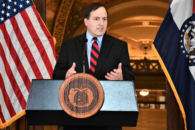JEFFERSON CITY, Mo. — A St. Louis attorney suing the state over the ballot language of a bevy of initiative petitions has received approval to circulate another batch of potential measures.
The most recent set of initiative petitions covered the same overarching topics as the first: automatic voter registration and voting by mail.
This week, Secretary of State Jay Ashcroft issued ballot language for eight citizen-initiated changes filed by Mary Anne Sedey. This brings the total number measures authorized to gather signatures up to 52, of which 24 have been submitted by Sedey.
The proposals are similar in nature — with a variety of additional provisions sprinkled throughout the multiple versions.
All of the petitions, as worded in the ballot language, seek to amend the Missouri Constitution to “establish automatic voter registration of adults from state agency lists” and “allow voters to sign up to permanently vote by mail.”
Some of the other provisions — not in all of the petitions — include, per the ballot language: allowing in-person voting the weekend before an election, giving 16 and 17 year olds an opportunity to pre-register to vote, and requiring the secretary of state and election authorities to make available a list of registered voters who voted by a particular method.
The ballot language of the first 16 Sedey filed spurred a legal challenge. In August, Sedey filed a lawsuit in Cole County alleging the “biased and inflammatory” summaries of petitions were “intentionally cherry-picked” and described “in as loaded and pejorative terms as possible.”
The ballot language of one petition included the provision to “establish automatic voter registration of individuals at least 16 years old from state agency lists.” The lawsuit contended it should actually read “allow eligible citizens ages 16 and 17 to pre-register to vote.”
A hearing in the legal challenge is scheduled for Oct. 10.
Petitioners have until May 3, 2020, to deliver signed petitions to the Secretary of State’s Office. Proposed constitutional changes must be signed by 8 percent of legal voters in any six of the eight congressional districts, which amounts to a minimum of 160,199 signatures. Proposed statutory changes must be signed by 5 percent of legal voters in any six of the eight congressional districts, which amounts to a minimum of 100,126 signatures.
This article is part of a periodic update on the initiative petition process. Other stories in the series can be found here.

Alisha Shurr was a reporter for The Missouri Times and The Missouri Times Magazine. She joined The Missouri Times in January 2018 after working as a copy editor for her hometown newspaper in Southern Oregon. Alisha is a graduate of Kansas State University.




















